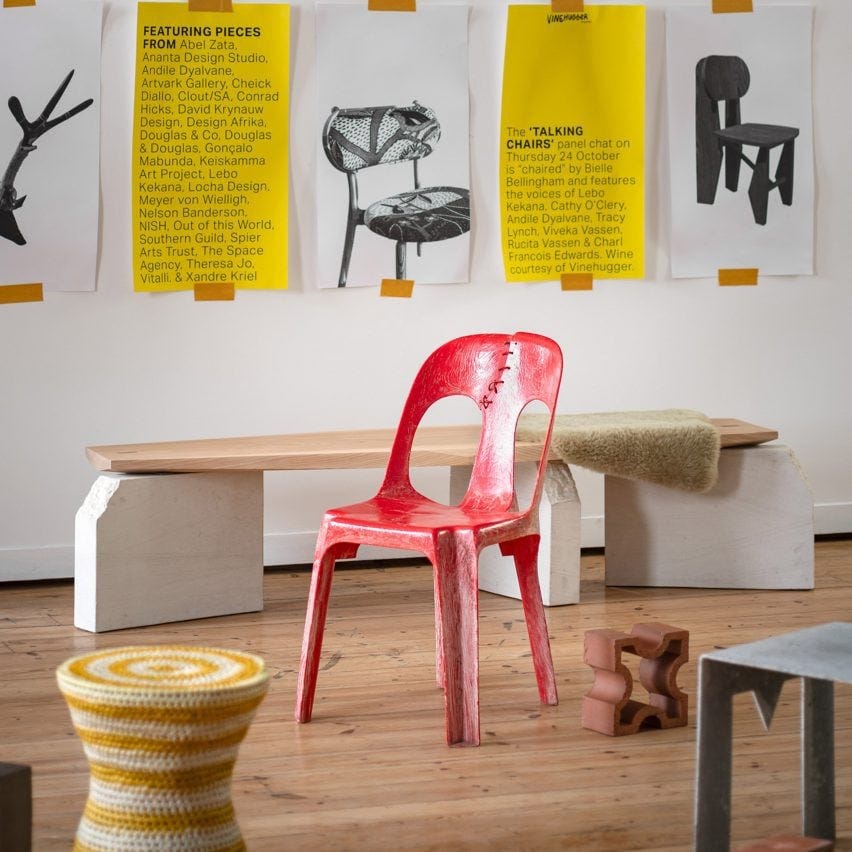🔅 What Africa's Chair Exhibition Reveals About its Heritage
Namibia Heads to the Polls & Mozambique's Post-Election Violence
Image of the Day
Good Morning from Malawi!

Spotlight Stories
The Chairs of Africa: A Seat at the Table for Diverse Design
Design Week South Africa just dropped the inaugural Africa Chair exhibition, and let us tell you, it features an interesting ride through the continent's seating scene. Curators Marlon Leggat and Charl Edwards scoured the land to bring together 32 chairs from 12 countries that showcase the creativity, craftsmanship, and downright quirkiness of African design.
The exhibition featured a diversity of seating, from a 19th-century Tuareg camel saddle to a throne made of guns by Mozambican artist and anti-war activist Gonçalo Mabunda (how’s that for a conversation piece!).
One standout was a humble red plastic garden chair, lovingly mended with electric wire (If you know, you know…) by an unknown South African designer.

The show spotlighted many other rising stars of the African design scene. There was the Boog chair by South African designer Xandre Kriel, a marvel of minimalism inspired by a car suspension spring. And the colorful, cassette tape-crocheted Masaruma stool by Ananta Design Studio, a sibling duo shaking up the local aesthetic.
So what's the takeaway? African design is as diverse and dynamic as the continent itself. From the traditional to the cutting-edge, from the practical to the political, these chairs tell stories that deserve to be heard.
Namibia Heads to the Polls: Will SWAPO's 34-Year Reign Continue?

It's election time in Namibia, and Namibians are currently casting their votes in what's shaping up to be the most competitive election yet for the ruling SWAPO party, which has been running the show for a whopping 34 years.
SWAPO's candidate, Netumbo Nandi-Ndaitwah, could make history by becoming the country's first female president. But let's not count our chickens before they hatch—a SWAPO loss would mean the first transition of power to a new party since Namibia gained independence from apartheid South Africa in 1990.
Indeed, high unemployment, corruption allegations, and inequality have taken a toll on SWAPO's popularity. In the 2019 presidential election, their support dropped to 56% from a stunning 87% in 2014. While there are no reliable polls to predict how they'll fare this time around, it's safe to say they're feeling the heat.
Leading the charge among 14 opposition candidates: Panduleni Itula is a former dentist who split from SWAPO and now leads a new political party, the Independent Patriots for Change. Itula scored an impressive 29% of votes in 2019—not too shabby for a newbie on the political scene.
According to Rui Tyitende, a lecturer at the University of Namibia, the outcome will largely depend on the turnout of young voters, who make up more than half the electorate and are more likely to back the opposition. "Young people are disproportionately affected by unemployment, poverty and consumed with a deep sense of hopelessness," Tyitende said. "If they do not pitch, SWAPO will win." No pressure, youth of Namibia!
Despite being an upper-middle-income country, Namibia has high levels of poverty and inequality, ranking second in the world for income inequality after neighboring South Africa.
SWAPO has been trying to distance itself from corruption scandals, although Nandi-Ndaitwah has never been implicated. Two former ministers are still on trial in the "fishrot" case, a major bribery scandal that surfaced in 2019.
Analysts think there's a possibility that SWAPO could face a fate similar to South Africa's African National Congress (ANC) or Botswana's Botswana Democratic Party (BDP). The ANC lost its parliamentary majority in May and was forced into a coalition after 30 years in power, while the BDP lost an October election which ended its 58-year rule.
Mozambique's Post-Election Protests Turn Deadly

Mozambique's capital, Maputo, has been rocked by tragedy as young protesters, some as young as 16, have been killed while demonstrating against the results of last month's presidential election. The funerals of these young victims have been a reminder of the volatile political climate in the southern African nation.
Antonio Juaqim, a 16-year-old boy, was shot dead while banging pots and pans in an opposition-organised protest. CCTV footage from nearby shops showed police shooting at protesters.
The protests erupted after Frelimo, the former liberation movement that has been in power since Mozambique gained independence 49 years ago, was declared the winner of the presidential election. Frelimo's candidate, Daniel Chapo, allegedly won with 71% of the vote, while his closest rival, Venâncio Mondlane, received only 20%.
Mondlane, an evangelical pastor who contested the presidency as an independent after breaking away from the main opposition Renamo party, rejected the results, alleging that the poll was rigged. He has rallied his supporters via social media to protest against the outcome, with people banging pots and pans in their homes every night at 21:00 local time.
Human Rights Watch reports that about 40 people, including at least 10 children, have been killed by police during the post-election protests. Mozambique's police commander, Bernadino Raphael, expressed sympathy with the families of the victims but blamed Mondlane's supporters for using children as shields.
However, Albino Forquilha, the leader of the Optimist Party for the Development of Mozambique, accused police of using excessive force to suppress dissent, saying, "It feels as though they are being used to protect the ruling party."
As Mozambique awaits the court's ruling on Mondlane's bid to annul the election results, the country is going through one of its most turbulent periods since the advent of multi-party democracy about 30 years ago.
The deaths of young protesters like Antonio Juaqim and 20-year-old Alito Momad, who was also allegedly killed by police during the protests, have left their friends and relatives hoping for justice in a nation where political tensions are running high.
Food for Thought
“If you burn a house, you can’t hide the smoke.”
— Angolan Proverb




